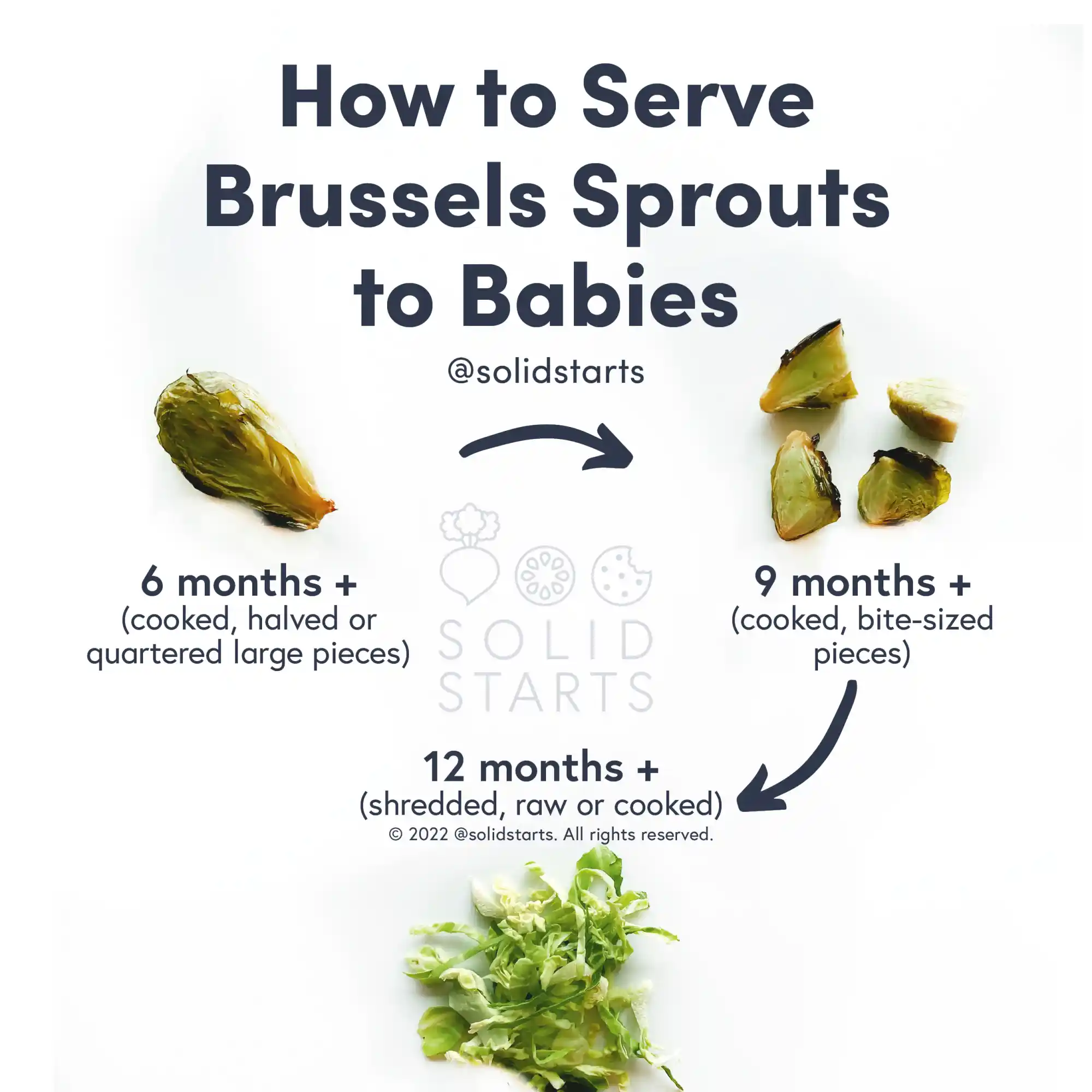Access our First Foods® Database in the Solid Starts App.
Learn moreBrussels Sprouts
Vegetable
Age Suggestion
6 months
Iron-Rich
No
Common Allergen
No

When can babies have brussels sprouts?
Brussels sprouts may be introduced as soon as baby is ready to start solids, which is generally around 6 months of age.
Brussels sprouts are brassicas—a diverse plant family derived from wild cabbages in the Mediterranean region. Ancient migration and trade led to cabbage varieties that thrived in cooler climates, like the farmlands near Brussels, where “spruitjes” have been widely grown since the 13th century. With trade across the North Sea, the tiny sprouts took on the name of the Belgian capital where they grew. Brussels sprouts can taste bitter, although recent agricultural innovation has led to new varieties that are less bitter and offer a nuttier, slightly sweeter flavor.
How do you serve brussels sprouts to babies?
Every baby develops on their own timeline, and the suggestions on how to cut or prepare particular foods are generalizations for a broad audience.
6 months old +:
Offer a whole large brussels sprout (bigger than baby’s mouth, at least 2 inches in diameter) that has been cooked until soft, or serve large cooked brussels sprouts cut into halves or quarters. If the brussels sprouts are small, cook until soft, shred or chop, then mix into a soft, scoopable food like mashed potato for baby to scoop. While you can offer well-cooked shredded brussels sprouts on their own, the small pieces may cling to baby’s tongue and the inside of their mouth, which can cause some harmless gagging.
9 months old +:
Serve bite-sized or quartered pieces of brussels sprouts that have been cooked until soft for baby to practice picking up with their developing pincer grasp (where the thumb and pointer finger meet). You can also continue to serve large whole or halved, well-cooked, brussels sprouts for baby to practice taking bites from. At this age, some babies get more ambitious and are more likely to overstuff their mouth with food, so make sure the sprouts are cooked until fully soft, and work on coaching baby how to spit when their mouth is too full of food. If you’d like to serve raw brussels sprouts, you can serve the sprouts shredded or grated, either on their own or mixed into other foods. Just know that small pieces of raw brussels sprouts may cause some harmless gagging and spitting as pieces may be tough to chew and can stick to the inside of baby’s mouth. To reduce discomfort, cook the sprouts until soft, or offer a small drink in an open cup to help wash down the food.
12 months old +:
Cook with brussels sprouts as desired in family meals and continue serving raw, shredded brussels sprouts. When you feel comfortable with the child’s biting and chewing skills, try decreasing the cooking time a bit to offer bite-sized and quarter pieces of brussels sprouts that are a bit firmer in texture. This is also a great age to encourage self-feeding with utensils. If the child needs help, simply pre-load an age-appropriate fork with bite-sized pieces of cooked brussels sprouts, and lay it next to the food for the child to pick up. Alternatively, pass the utensil in the air for the child to grab from you.


How to prepare brussels sprouts for babies 6 months+.
Videos
Are brussels sprouts a choking hazard for babies?
Yes, raw or undercooked brussels sprouts are firm and difficult to chew, qualities that increase the risk of choking. To reduce the risk, prepare and serve brussels sprouts in an age-appropriate way as described in the How to Serve section. As always, make sure you create a safe eating environment and stay within an arm’s reach of baby during meals.
Learn the signs of choking and gagging and more about choking first aid in our free guides, Infant Rescue and Toddler Rescue.
Are brussels sprouts a common allergen?
No. Allergies to brussels sprouts are rare, but possible. Individuals who are allergic or sensitive to other members of the cruciferous family, such as mustard greens and cauliflower, may also be sensitive to brussels sprouts. People who are allergic to mugwort may be allergic to brussels sprouts or experience Oral Allergy Syndrome (also known as pollen-food allergy). Oral Allergy Syndrome typically results in short-lived itching, tingling, or burning in the mouth and is unlikely to result in a dangerous reaction.
As you would when introducing any new food, start by offering a small quantity for the first few servings. If there is no adverse reaction, gradually increase the quantity over future meals.
Are brussels sprouts healthy for babies?
Yes. Brussels sprouts are loaded with fiber, folate, B vitamins, potassium, and vitamin K. Brussels sprouts also provide some vitamin E, choline, iron, and zinc. That’s not all—they provide pretty much every other nutrient babies need to thrive, including calcium, vitamin A, and carotenoids (beta-carotene, lutein, and zeaxanthin), vitamin C, and magnesium. Plus, they are packed with phytonutrients that help protect human cells, support the immune system, and fight against cancer. Lastly, they contain a dash of alpha-linolenic acid (ALA) omega-3 fatty acids, which aid in healthy brain development.
What are some great first foods for babies?
There are many wonderful options. Look for foods that are easy for baby to feed to themselves, that are low in choking risk, and that offer nutrients babies need, such as iron. A few of our favorite first foods include cooked broccoli, oatmeal, and mango pits.
Do I need to start solids with purees?
You can if you’d like, but there's no developmental need to start with textureless food. Babies can be served modified versions of what you eat. Use our First Foods Database to find how to safely serve any food.
Our Team
Written by
Expert Tips Delivered to Your Inbox
Sign up for weekly tips, recipes and more!
Copyright © 2026 • Solid Starts Inc








